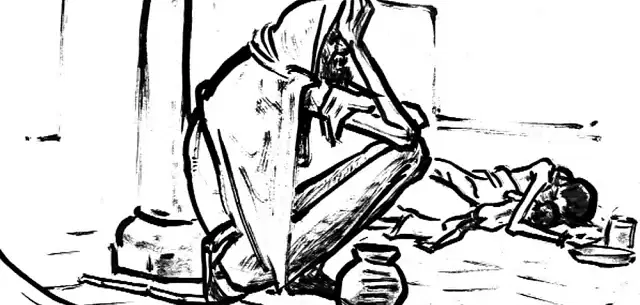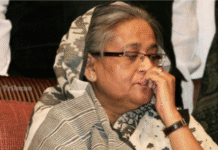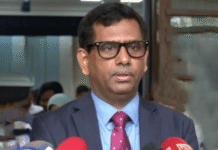
“Please quarantine politicising COVID. If we want to win, we shouldn’t waste time pointing fingers….” This momentous call was made by the World Health Organisation (WHO) Director-General Tedros Adhanom Ghebreyesus recently.
Pandemic and politics – the ‘p’ words stand equal at one point. Both of them need humans to propagate. One spreads out through veins while other through minds.
Pandemics, epidemics or plagues – nothing is new in Bengal, this land of wonders. Bengalis are quite familiar with the sufferings of all deadly crises. The colonial history of this land is, too, the history of famine, plague and epidemic. Each and every viral outbreak took huge toll on commoners and led to grim famine.
Most significantly, the bucolic plague in 1896, widely known as Third Plague Pandemic, was the most lethal. In September 1896 when the bucolic plague broke out in Bombay, now Mumbai, the British Raj was quite comfortable on their ‘iron throne’. It sprawled out to Bengal and then took a world tour. The plague, which later turned into the pandemic, ran a riot in the Bombay Presidency. The pandemic claimed more 12 million lives between 1896 and 1930. This is because of politicising the plague as the colonial masters did not want to forgo their political status quo.
While dealing with the deadly pandemic, British rulers made five big mistakes. Nearly a hundred years after the end the colonial zombism, we still see the recurrence of apathetic attitudes of the democratic regimes in this region when another pandemic emerges.
The disease, as stated by The British Medical Journal published on 10 February 1900, ‘first spread in Bengal through a ‘dom’ [lowly cleaner] who assisted in the autopsy of a plague victim.’ When the very first case was reported in Kolkata seeding the possible epidemic, the physicians of the local government put pressure on the British rulers to form a medical board. The colonial rulers finally formed the board, but it was just an eyewash. They did not want to compromise their political peace in that time as the board immediately rejected first case of plague. Several more cases were also reported later in October of the year. The British board then again denied the reports.
Quoting Municipal Medical File published in March 1897, Srilata Chatterjee in his article Plague and Politics in Bengal 1896 to 1898, said, “The Health Office of the Corporation had also reported suspected cases of plague in the city and its suburbs in October 1896. These reports created a stir in Kolkata. While the medical board vehemently denied these reports, Dr Simpson the Health Officer strongly suggested the existence of plague in a benign stage in Kolkata in October 1896 or even prior to that. He accused that ‘the medical Board, owning to its composition probably shows a tendency in its letter to be swayed by minor considerations rather than by the most important viz. the protection of the Calcutta and the province from the plague.”
The British corporations did not pay any heed to suggestions from Simpson either. Instead they had in their minds only businesses and money. Fearing a global embargo, they deferred every action they later rushed in when plague went out of control. The rulers even did not want to refer the early Kolkata case in any public documents. So, history now only recites the year 1898 for the outbreak.
Secondly, big mistake the colonial monsters made was curtailing press freedom. The panic stricken British policy makers went tough on press and adopted hawkish measures. RC Dutt in his book tiled The Economic History of India in the Victorian Age: From the Accession of Queen Victoria in 1837 to the Commencement of the Twentieth Century, II (Great Britain, 1902) noted that, they rather espoused ‘rigorous persecution against press, severe sentences and the imprisonment of editors without trial.’
As a nation we are prone to rumours even in this 21st century when science is ready to answer anything. Following the outbreak of the coronavirus pandemic, some rumours branched out over medicinal uses of traditional herbs. Most ridiculously, the case of thankuni pata, which is a traditional herb to treat patients during fever and cold, went viral. Somewhere in the country leaves of the herbs were sold out at ludicrously high prices. The periodical Chikitshak o Somalochak published in 1896 and Swastho published 1898 describe such an incident as saying the ‘indigenous medical treatments were recommended.’ Some were using brandy, camphor and musk plants.
Here people bought the pandemic with precarious rumours. Some people started believing that consuming alcohol, nicotine and even juice of bitter gourd will cure coronavirus. Sometimes we tend to belief in miracles. This is totally absurd. It is a novel virus. The scientists across the world are struggling to find a workable solution where we are resorting to the traditional knowledge.
Fourthly, David Arnold started his book Touching the Body: Perspectives on the Indian Plague 1896-1900 as saying, “What is medically desirable may be practically impossible and politically dangerous.” The British rulers tried the dangerous method while treating the plague. They preferred to see the plague through political eyes rather than medical science. They did not listen to the physicians and neglected the possible intensity of the crisis and let the indigenous community use of traditional methods instead of scientific course of action.
To put up a strong fight against current coronavirus pandemic, Angela Merkel’s regime must be acclaimed. Behind Germany’s exemplary success in fighting this coronavirus pandemic, as experts say, was people’s trust in the Merkel’s government. Trust in her government made people united and any action from the government made it easier to impact public.
Mistakes ate up the rotting colonial legacy. They neither could contain the plague nor the economic and political damage nor the international restriction. But, it could have been stopped in that very year if they listened to medical science and took up realistic approaches.
History has always two things to offer – recapitulation of the past and lessons for the future. More than a century later, the colonial ghosts still play pranks on us as we see just the repetition of same mistakes during another pandemic. Some opportunities which were created at the early hours of the pandemic outbreak have already been lost. We now live in a different era of different political forces which are entirely ours. These mistakes must not recur.
Time hasn’t run out. It is in our grip. We just need a momentum. We can go back to WHO DG Tedros once again as he said, “I will suggest two things to the world — the first is national unity, and the second is global solidarity”. These are the strongest weapons to conquer this bloody war against the deadly virus.
*Toriqul Islam is a journalist working at Prothom Alo. He can be reached at toriqul38@gmail.com.









